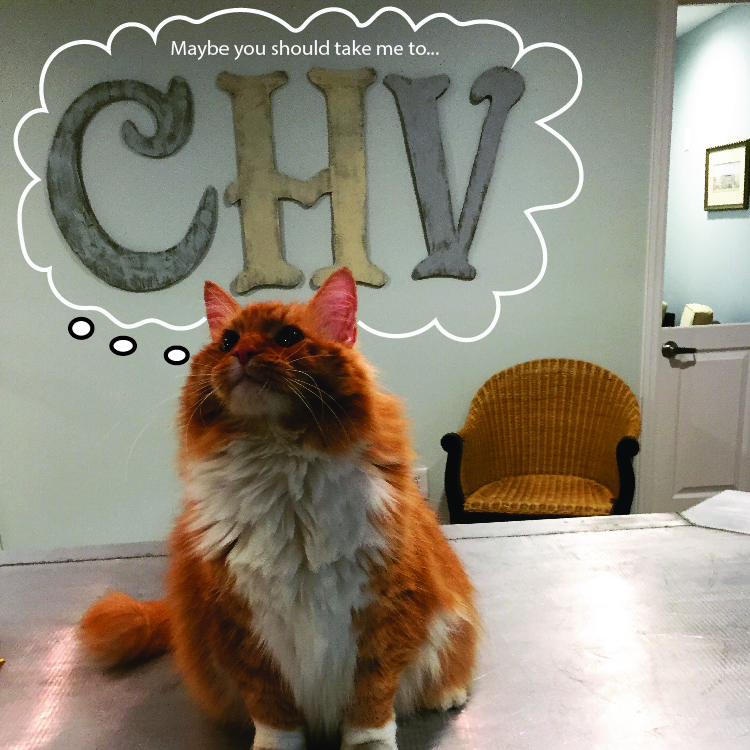By: Janette Blackwood, DVM

I was chatting with a friend yesterday when she shared a secret. Her beloved kitty was way overdue for a veterinary visit. When I asked her why, she confessed that she felt that a vet visit wasn’t needed. Her cat does not go outside or have exposure to other cats so vaccines (and a veterinary visit) are not a priority.
Almost every issue of current veterinary journals and magazines are asking this question: why don’t clients feel that their cat needs to visit the veterinarian annually? Honestly, as a veterinarian, I feel that our profession is largely to blame for this incorrect information. In the recent past, members of the veterinary profession used annual vaccines as the sole means for getting clients to walk through the veterinary doors. Therefore, clients started to associate that the need for a seemingly healthy cat to visit the veterinarian was linked only to that cat’s need to be vaccinated. Yet, vaccines aren’t the only important factor in cat check-ups at the vet; so many other valuable health benefits stem from regular veterinary visits!
Besides just vaccinations for your cat, below are some alternative thoughts I would like for you to consider about the importance of regular veterinary visits.
The most important part of the veterinary visit is the physical exam. A lot is happening in the 5 to 10 minutes when your veterinarian examines your pet. During this time, we are:
· looking for eye, ear, and dental infections
· listening to your cat’s heart for any murmurs or arrhythmias
· evaluating his weight and feeling the mobility of his joints for signs of arthritis
· checking to see if any palpable masses can be detected
· assessing the bowel to make sure there is no constipation
· ensuring that the bladder is relaxed and emptying properly
· talking to you, the owner, about any changes in behavior, eating, drinking, or litterbox habits
We complete a thorough investigation because cats are experts at hiding illnesses, even painful ones. For example, if a tooth is fractured and a sharp pain is felt when eating, a cat will learn to chew on the other side of her mouth or gradually just stop eating as much. When you share your home with multiple cats, it can be very difficult to know that one cat is eating 25% less and experiencing daily oral pain. Another opportunistic cat may be taking the opportunity to eat the extra food, and the food bowl looks the same at the end of the day.
Many diseases are much easier and cheaper to manage/treat when caught early or are able to be prevented. A great example of disease prevention is cat’s oral hygiene. Ask me any day and I will tell you that I would much rather complete a Grade 1 dental cleaning and polishing (no oral surgery or tooth extractions) on your cat’s mouth than a Grade 4 (multiple surgical extractions of double rooted teeth). By the time dental disease has reached the end-stage level of infection of Grade 4 periodontal disease, we usually find significant oral pain during the physical exam and a loss of viability of multiple teeth. The amount of time and skill required to treat Grade 4 periodontal disease is why your cost for the procedure is significantly higher (sometimes even hundreds of dollars higher) than if we had just treated the dental disease at its earliest state.
Parasites are a very real concern even for indoor cats. And, people can catch some of them, too! Every winter, I meet a cat strictly living indoors that has a flea infestation so severe that the cat looks like a pepper shaker sprinkling flea dirt (flea feces) across the exam table as it walks. Fleas are experts at finding warm places to hunker down for the winter (such as an indoor cat) after catching a ride inside from another member of the family. And, I have seen indoor cats secretly carrying intestinal parasites too, without any clinical signs in the litter box that would alert an owner that a problem exists. We find the parasitic eggs during a fecal screen (underneath the microscope) and treat them before the cat becomes clinically ill, protecting both your cat and your family. Your veterinarian will also be able to prescribe for your cat a monthly safe and effective parasite prevention to keep your cat free of fleas, intestinal parasites, and heartworms. You have to be careful though because many over the counter feline flea preventives found at common “big box” stores or online are a waste of money, completely ineffective, and may even have severely harmful side effects to healthy cats. Your veterinarian will cover safe parasite control with you during the office visit.
Having all pets vaccinated against the rabies virus is the law. South Carolina law is very clear about pets and their need for rabies vaccinations. Because the rabies virus kills people when exposed, all pets living or traveling through South Carolina must be up to date on their rabies vaccines. This law includes indoor kitties, as cats have been known to escape on occasion and rabid wildlife are known for being particularly aggressive, making accidental exposure to your pet possible. Cat owners who find their unvaccinated pet picked up by animal control while roaming in the neighborhood or involved in a cat bite to a neighbor could find themselves at the wrong end of fines or legal action, even if their cat is completely healthy.
If you have any feline family members who are overdue a veterinary visit, we would love to meet them. You are always welcome to come by and check out our staff and facility, and talk to us about how we can help make your visit easier and lower in stress.
Janette Blackwood, DVM